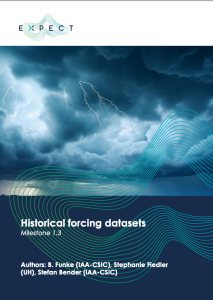Authors: B. Funke (IAA-CSIC), Stephanie Fiedler (UH), Stefan Bender (IAA-CSIC)
Abstract
The climate system is changing rapidly and some regions have seen increases in extremes beyond what is expected from climate model simulations. To support targeted climate adaptation strategies, EXPECT will enable trustworthy assessments and predictions of regional climate change including extremes by developing a prototype operational capability for integrated attribution and prediction of climate. This ambitious goal is closely aligned with the WCRP Lighthouse Activity on Explaining and Predicting Earth System Change.
EXPECT will identify and quantify the mechanisms by which physical processes govern regional climatic changes, including extremes, on inter-annual to multi-decadal time scales. It will do so by exploiting newly available climate simulations and Earth Observations (EOs), and by combining machine learning (ML) with physical methods. The research will target fundamental knowledge gaps related to atmospheric circulation and land-atmosphere interactions, which represent major limitations in current climate predictions and projections, and in particular in understanding changes in European summer extremes.
To underpin the research, and benefiting the wider research community, EXPECT will develop tools to efficiently analyze a variety of large data sets in combination that are hosted in different repositories across institutions. This will facilitate the exploitation of recent investments into high-resolution climate models and EO data. EXPECT will further build data science capacity for the scientifically robust, efficient and reproducible analysis of the massive data assets, including novel ML approaches, and provide training for the climate science community and the next generation of researchers in particular.
EXPECT will thus deliver significant scientific and technological advances for society and the climate science community that will last well beyond the project, in support of WCRP’s strategic objectives.
